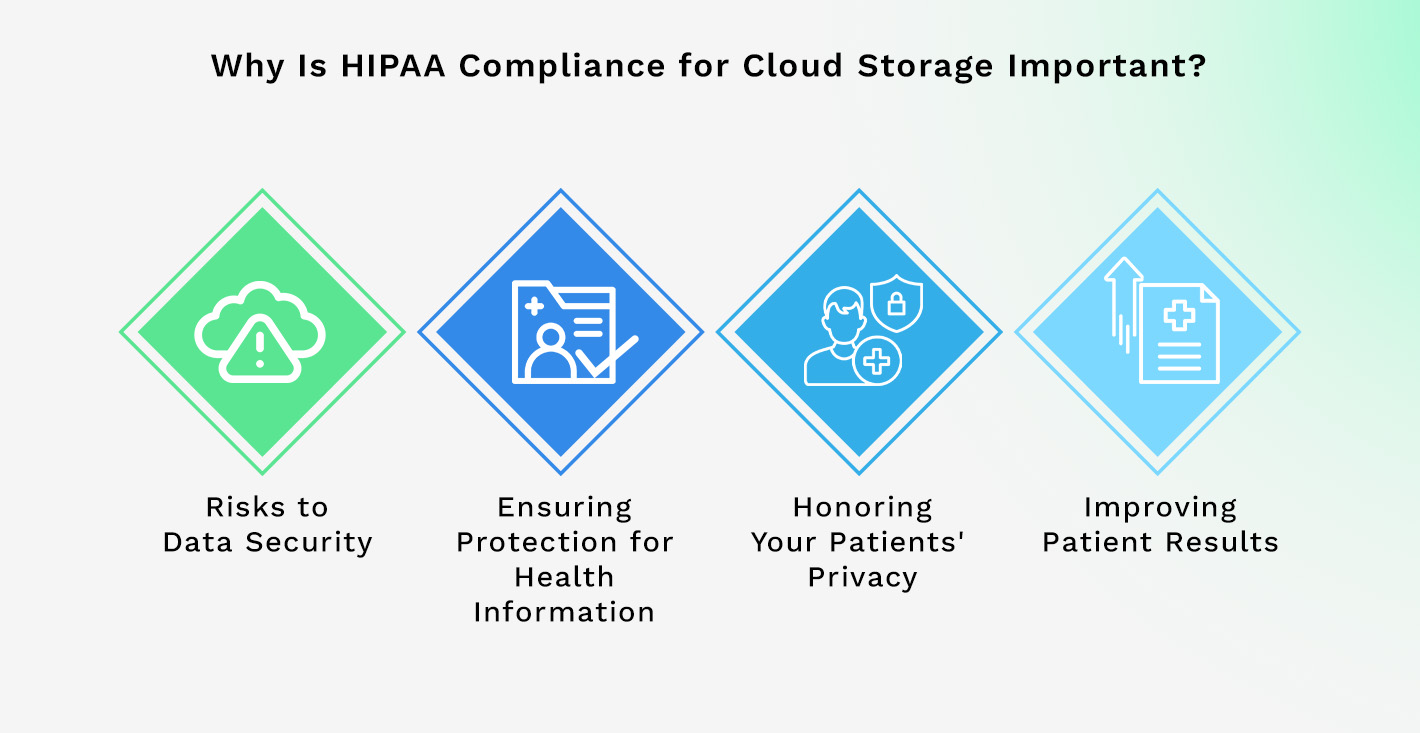Keeping sensitive healthcare information secure is more important than ever. With the increasing reliance on cloud storage, healthcare organizations must find solutions that meet the strict requirements of HIPAA regulations. In this post, we'll explore five leading cloud storage options that prioritize HIPAA compliance, helping you protect patient data effectively.
We'll buid your first application for you. At no extra cost.
Let us build your first business application for free. Go from an idea to an application in under 2 weeks.

What Is HIPAA-Compliant Cloud Storage?
HIPAA-compliant cloud storage is an online file-storing service that adheres to the rigorous standards set by the Health Insurance Portability and Accountability Act (HIPAA). A cloud service is considered compliant if it includes specific mechanisms and controls that secure Protected Health Information (PHI), such as advanced encryption, user authentication, access logs, and backup systems.
Such cloud storage platforms are actively managed to ensure they meet HIPAA's Privacy and Security Rules, which dictate how PHI should be handled, transferred, and preserved. The goal is to protect sensitive health data from unauthorized access and breaches, which are critical in maintaining the trust between healthcare providers and their patients.
Why Is HIPAA Compliance for Cloud Storage Important?
HIPAA compliance ensures that sensitive medical information stored in the cloud remains secure and private. Compliance with HIPAA regulations helps prevent unauthorized access, maintains confidentiality, and builds trust between patients and healthcare providers. Here's why HIPAA compliance for cloud storage is important:
Risks to Data Security
Data security within the healthcare sector faces numerous risks, including cyber-attacks like hacking and phishing, which threaten to compromise patient data daily. Other risks include internal breaches resulting from employee error or malicious intent, as well as physical theft of devices containing PHI. Natural disasters can also threaten localized data storage systems, potentially resulting in irreversible data loss.
HIPAA-compliant cloud storage services provide sophisticated security measures that are continuously updated to combat emerging threats and mitigate these risks. Having data securely stored offsite, in encrypted form, significantly reduces the risk of PHI exposure.
Ensuring Protection for Health Information
Protecting health information is a top priority for healthcare organizations. From 2009 to 2023, there were 5,887 healthcare data breaches, each involving 500 or more records. These breaches led to the exposure or unauthorized disclosure of 519,935,970 healthcare records.
HIPAA-compliant cloud storage ensures that sensitive patient data is safeguarded with strict encryption protocols in transit and at rest. Access controls limit data availability to authorized personnel and combine with multi-factor authentication to verify user identities.
Cloud storage providers also maintain detailed audit logs that record any PHI access. Such services also often employ regular security assessments and updates to defend against cyber threats.
Honoring Your Patients' Privacy
Respecting and protecting patient privacy is a legal requirement but also a cornerstone of patients' trust in their healthcare providers. Healthcare organizations implement high-standard privacy measures and utilize HIPAA-compliant cloud storage to honor that trust. These measures include access restrictions, ensuring only those with the necessary rights can view sensitive information, and employing tools to prevent unauthorized disclosures.
Employee training and policies that prioritize patient confidentiality ensure that cloud services maintain a culture of privacy. The commitment to patient privacy reinforces the patient-provider relationship and upholds the reputation of healthcare organizations.
Improving Patient Results
Giving healthcare providers secure and immediate access to patient health records enables them to deliver more precise diagnoses and effectively tailor treatment plans. Real-time collaboration across different healthcare providers also improves the quality of care and can lead to more efficient and improved patient results.
HIPAA-compliant cloud services facilitate secure mobility, enabling doctors to access documents on the go, which is very important in time-sensitive situations. Better care coordination and the ability to centralize departmental assets mean that healthcare teams can collaborate on patient care with improved outcomes.

Top 5 HIPAA-Compliant Cloud Storage Services for 2024
Below, we've compiled a list of the best cloud storage services to help you safeguard sensitive healthcare data effectively.
1. Kohezion

Kohezion offers a specialized HIPAA-compliant cloud storage solution for online database applications. This software allows healthcare organizations to create custom applications without coding, streamlining the data management process.
Top 5 Features:
- Online database application with zero coding.
- Custom application templates specific to healthcare needs.
- Robust user access controls to maintain data confidentiality.
- Comprehensive audit trails for monitoring data modifications.
- Strong data encryption in transit and at rest.
Benefits:
- Improves the effectiveness of data management workflows.
- Simplifies the transition from paper to digital records.
- Reduces the risk of data breaches with its security-focused features.
- Enables healthcare entities to scale applications according to their needs.
- Dedicated features facilitate compliance with HIPAA regulations.
Cons:
- Learning curve associated with application customization.
- It may require additional technical support for complex customization.
Best for:
- Healthcare organizations looking to develop custom database applications while ensuring HIPAA compliance.
2. Google Cloud Platform

Google Cloud Platform (GCP) provides robust infrastructure and services that cater to the needs of healthcare professionals and ensure the strong protection of PHI.
Top 5 Features:
- Comprehensive data encryption at rest and in transit.
- Fine-grained identity and access management controls.
- Advanced audit logs for transparent tracking of PHI access.
- AI and machine learning capabilities for data analysis while maintaining compliance.
- G Suite integration offers a collaborative environment with secure document sharing.
Benefits:
- Users can leverage Google's powerful infrastructure to securely manage large volumes of data.
- The platform's scalability caters to organizations of any size.
- Extensive security features help prevent data breaches and unauthorized access.
- Innovative AI tools allow for superior data insights without compromising compliance.
- Integration with G Suite simplifies workflow while upholding HIPAA standards.
Cons:
- The complexity of the platform can be daunting for new users.
- Managing costs can be challenging because of its pay-as-you-use pricing model.
Best for:
- Healthcare organizations and research institutions that need extensive data analytics capabilities without sacrificing compliance needs.
3. Amazon Web Services (AWS)

Amazon Web Services (AWS) offers a wealth of features and a solid infrastructure for healthcare organizations looking to manage their sensitive data securely.
Top 5 Features:
- Server-side encryption using industry-standard methods.
- AWS Identity and Access Management (IAM) for detailed access control.
- Amazon Macie for discovering and protecting sensitive data in AWS.
- Compliance with the highest standards, offering a 99.999999999% annual durability.
- Flexible payment plans with a pay-as-you-go model.
Benefits:
- AWS's strong encryption and comprehensive IAM ensure top-notch data security.
- The pay-as-you-go pricing model is cost-effective for different organization sizes.
- Scalable storage solutions can accommodate growing amounts of healthcare data.
- The platform's durability minimizes the risk of data loss.
- They offer guidance on configuring HIPAA-compliant storage, with the option to sign a BAA.
Cons:
- It can be complex to navigate for those new to cloud platforms.
- Some services and features may come with additional costs.
Best for:
- Healthcare entities that need flexibility, reliability, and in-depth compliance in their cloud storage solutions.
4. Microsoft Azure

Microsoft Azure offers a secure and versatile platform tailored for the healthcare industry. Azure's built-in features and compliance with HIPAA protect sensitive healthcare data and ensure uninterrupted service.
Top 5 Features:
- Advanced data encryption for data at rest and in transit.
- Network isolation and role-based authentication.
- Real-time monitoring and analytics for user activity.
- Microsoft Azure Backup service for reliable data recovery.
- Compliance offerings specifically configured for HIPAA.
Benefits:
- Azure’s security ensures the highest level of data protection, including HIPAA safeguards.
- Its real-time monitoring capabilities offer effective oversight and compliance management.
- The backup and recovery services support a robust approach to preventing data loss.
- Integration with other Microsoft services streamlines workflow across platforms.
- The Azure platform is known for its high scalability and ability to cater to the demands of growing healthcare organizations.
Cons:
- The interface may have a learning curve for those unfamiliar with Microsoft products.
- The total cost of operations can be high, depending on the chosen services.
Best for:
- Large healthcare providers and organizations needing in-depth data management and seamless integration with existing Microsoft software.
5. Alibaba Cloud

Alibaba Cloud has made significant inroads as a HIPAA-compliant option, offering robust infrastructure and innovative services.
Top 5 Features:
- Enterprise-level data encryption for stored and in-transit data.
- Access control policies ensure secure data handling.
- High-performance Elastic Compute Service (ECS) for scalable computing resources.
- Data redundancy across multiple availability zones for disaster recovery.
- Compliance with international security standards, including HIPAA guidelines.
Benefits:
- Alibaba Cloud's global data centers provide fast, reliable access to data from anywhere.
- High scalability with ECS enables healthcare companies to manage variable demands efficiently.
- Reliable data redundancy features improve the safety and availability of sensitive patient information.
- A diverse portfolio of services adds flexibility and value for different healthcare IT needs.
- It addresses compliance, making it easier for healthcare providers to focus on care delivery.
Cons:
- Some users may face a learning curve with the platform's extensive functionalities.
- Customer support might present challenges due to language barriers or time zone differences.
Best for:
- International healthcare organizations looking for a comprehensive and robust cloud platform with an emphasis on security and compliance.
The Importance of a Business Associate Agreement (BAA)
A Business Associate Agreement (BAA) is a legal document that ensures the cloud service provider (CSP) agrees to follow the strict regulatory standards for handling electronic Protected Health Information (ePHI).
Key aspects of the BAA cover the responsibilities of the CSP to implement safeguards, report security incidents, and assure that subcontractors also adhere to HIPAA standards if they handle ePHI. A robust BAA outlines the scope and duration of the engagement and specifies the permitted uses of PHI, retaining the trust between healthcare providers and their patients. Even unintentional ePHI disclosure by a CSP without a BAA can lead to significant legal actions and fines against a healthcare organization.
Build a HIPAA-Compliant Cloud Storage Service with Kohezion
Kohezion offers a user-friendly platform for creating a cloud storage system that follows HIPAA rules for safeguarding sensitive healthcare data. With Kohezion, you can customize your storage solution to ensure that patient information stays secure and confidential while being stored and accessed digitally. Kohezion's straightforward interface and flexible features make it accessible for healthcare organizations of all sizes.
Conclusion
HIPAA-compliant cloud storage solutions offer robust data protection and privacy that honor patients' trust and provide the necessary tools for healthcare organizations to improve patient outcomes effectively. Kohezion, Google Cloud Platform, Amazon Web Services, Microsoft Azure, and Alibaba Cloud stand out as top contenders, each with unique features to suit different organizational needs.
Assess your needs, understand the features, and choose a provider that guarantees HIPAA compliance and understands the importance of handling sensitive health information with the highest security and respect.
Start building with a free account
Frequently Asked Questions
Cloud storage can comply with HIPAA regulations, provided that the cloud service provider implements the safeguards required to protect ePHI. This includes encryption, access controls, and audit trails. Healthcare entities must sign BAAs with the providers to formalize compliance obligations.
Criteria determining HIPAA compliance for cloud services include encryption of data at rest and in transit, access controls, auditing measures, secure data backup, and a signed Business Associate Agreement (BAA). Services must also follow breach notification rules and support healthcare entities' compliance efforts.
Achieving HIPAA-compliant cloud storage primarily involves data encryption, implementing secure access controls, conducting regular security audits, reliably backing up data, and executing BAAs with service providers. Other measures include staff training and a robust disaster recovery plan.

